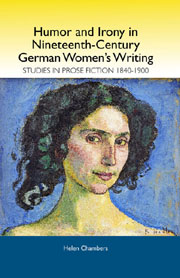Book contents
- Frontmatter
- Contents
- Acknowledgments
- Introduction
- 1 Annette von Droste-Hülshoff and Ida Hahn-Hahn: Overcoming Seriousness?
- 2 Ottilie Wildermuth and Helene Böhlau: Harmless Humor or Subtle Psychology?
- 3 Marie von Ebner-Eschenbach: Satire, Physical Comedy, Irony, and Deeper Meaning
- 4 Ada Christen and Clara Viebig: Laughter and Pain in the World of Work
- 5 Isolde Kurz and Ricarda Huch: The Humor of Skeptical Idealism
- Conclusion
- Works Cited
- Index
3 - Marie von Ebner-Eschenbach: Satire, Physical Comedy, Irony, and Deeper Meaning
Published online by Cambridge University Press: 05 February 2013
- Frontmatter
- Contents
- Acknowledgments
- Introduction
- 1 Annette von Droste-Hülshoff and Ida Hahn-Hahn: Overcoming Seriousness?
- 2 Ottilie Wildermuth and Helene Böhlau: Harmless Humor or Subtle Psychology?
- 3 Marie von Ebner-Eschenbach: Satire, Physical Comedy, Irony, and Deeper Meaning
- 4 Ada Christen and Clara Viebig: Laughter and Pain in the World of Work
- 5 Isolde Kurz and Ricarda Huch: The Humor of Skeptical Idealism
- Conclusion
- Works Cited
- Index
Summary
“So schlecht wie die andern kann ich's auch machen” sagte Kasperl, und schrieb ein Buch.
Erschüttern nicht, bewegen will ich euch, Erheitern auch ein wenig — wenn's gelingt.
MARIE VON EBNER-ESCHENBACH (1830–1916), whose life was coextensive with Franz Josef, the last Emperor of Austria's, fulfilled her social role as daughter and wife in an aristocratic family during a period in Europe when the social structures were shifting and the literary market was mushrooming. Her socially critical work addresses the relationship between classes, including the need to rethink the role of the nobility with a clearer awareness of power dynamics on social, psychological, and economic levels; while the writer's situation and its concommitant artistic and personal problems remains a core concern.
From an early age she enjoyed frequent visits to the theater in Vienna and had access to literature in her home. Although she loved reading and began writing young, she was a tomboy interested in dogs and horses and enjoyed outdoor activities in summer on the family estate at Zdislavic in Moravia. Dreaming of becoming the nineteenth-century Shakespeare, she spent years writing relatively unsuccessful plays, which caused herself anguish and her family embarrassment. Research suggests that there are gendered aspects to her failure as a dramatist and her social satire on the marriage market, Das Waldfräulein (1872), is eminently performable and deserves a place in the contemporary repertoire. Success came after 1880 with shorter prose forms and she also wrote three novels.
- Type
- Chapter
- Information
- Humor and Irony in Nineteenth-Century German Women's WritingStudies in Prose Fiction, 1840–1900, pp. 91 - 124Publisher: Boydell & BrewerPrint publication year: 2007



